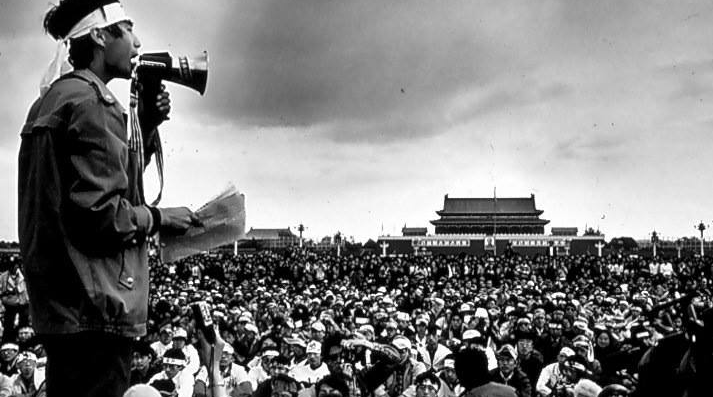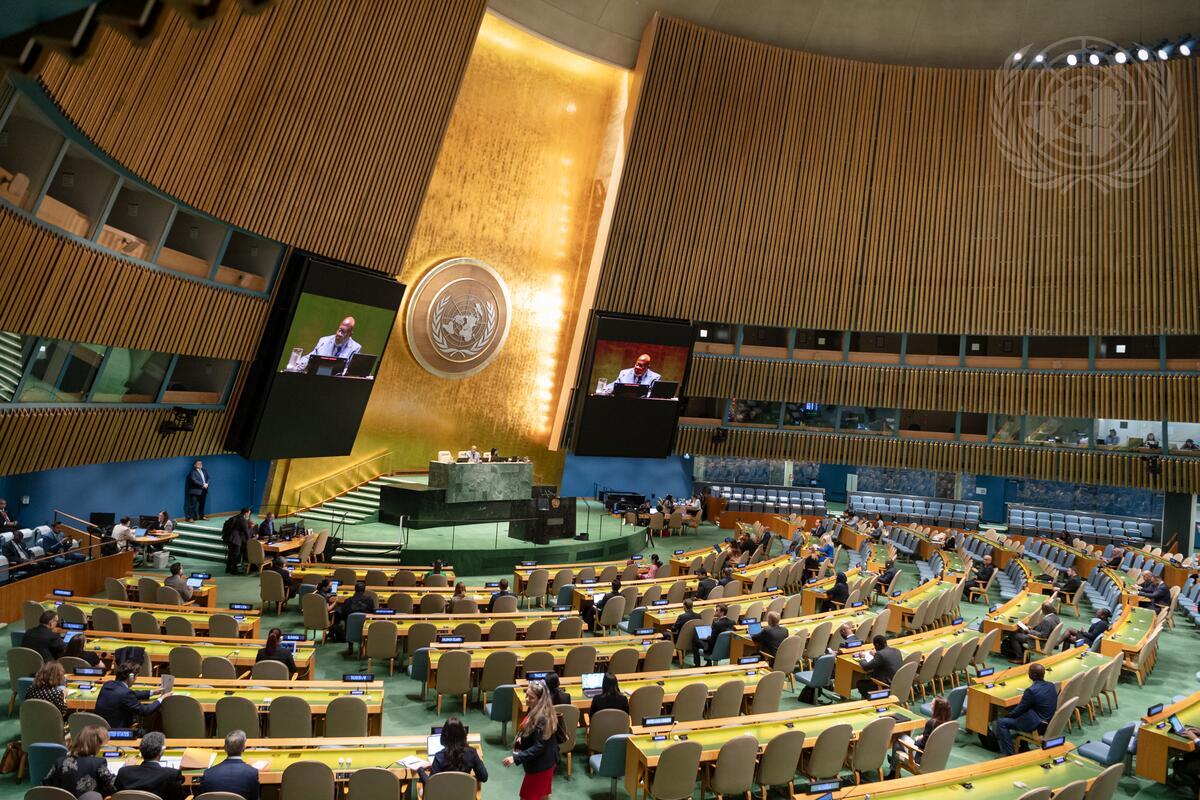Our lives are marked by the major events we live. A wedding date, the birthdays of our closest friends and family – even, thanks to social media, our work anniversaries.
In China, one event that defined a generation – not just of human rights activists, but of observers, students, diplomats and scholars around the globe – was the movement for democracy that spoke out for change, and was silenced by a violent military crackdown in and around Tiananmen Square on ‘June Fourth’ 1989.
On this thirtieth anniversary, 1989 student leader Wang Dan, has shared his story with us (点此以观看王丹访谈的中文版), and with international media.
Muting memories
For thirty years the Chinese government has not once wavered in its efforts to suppress information about the incident and its victims, and to repress those who seek to remember the crackdown and to hold to account those behind it. With the increase in pressure on civil society and human rights defenders over the last five years, these efforts have nearly succeeded.
Activists report being preventively detained or ‘forcibly vacationed’ around June Fourth, as well as other sensitive events. Travel bans may be arbitrarily applied for activists trying to go abroad during the June Fourth period, while others may be placed under higher-than-usual scrutiny and surveillance. Whether individually or collectively, online or off, the freedom to remember Tiananmen is severely curtailed for all Chinese citizens.
On this June Fourth, we call on the UN to urge China to end its censorship of Tiananmen and begin a process of truth, justice and reparations for victims, their families and the Chinese human rights movement.
Who are they, and where are they now?
Between April and June 2014, over 150 individuals were affected by a crackdown aiming at silencing any voice commemorating the 25th anniversary of the 1989 Tiananmen protests. In June of that year, a group of UN human rights experts wrote a letter asking China for answers about its suppression of eleven individuals, mostly lawyers and writers, who were persecuted for their human rights work and for their support to a human rights and democracy movement.
Since that time, these activists, and in many cases their families, have since faced continuous intimidation, surveillance, and harassment. In some cases the treatment was so severe that defenders chose or were forced to leave the country.
These were by no means the only victims of the crackdown, nor did it only happen in 2014. Various civil society report and UN documents show a nearly-annual, systematic pattern of detention, intimidation, interrogation, and enforced disappearance of human rights defenders linked to the anniversary of June Fourth. The authorities use such trumped up charges as ‘gathering a crowd to disrupt public order’, ‘picking quarrels and provoking troubles’ or ‘inciting subversion of State power’.
Subsequent crackdowns targeted a range of human rights activists, lawyers and petitioners, and sometimes ordinary citizens. In 2016, for example, four men were detained for producing labels for Chinese whiskey featuring images of the ‘tank man’ and a play on words (baijiu, the word for the alcohol, sounds nearly identical to bajiu, ‘89’, referring to the year of the Tiananmen crackdown). In 2017 Liu Xiaobo, a student leader at Tiananmen and Nobel Prize winner, died while in custody after serving a prison sentence for his authorship of ‘Charter 08’, launched with an eye to the twentieth anniversary of the crackdown.
To this day, Ding Zilin and the Tiananmen Mothers keep their children’s memories alive despite persistent limits on their freedom of movement and regular surveillance.
Profiles
The UN letter to China raised eleven different cases, which are just a snapshot of the kinds of work that brave defenders are doing in China, and which the Chinese government continues to criminalise and suppress.
Jiang Tianyong (江天勇) is a renowned human rights lawyer and a founder of the China Human Rights Lawyers Concern Group. Jiang has represented high-profile cases of human rights lawyers and supported families of victims of other crackdowns, including the one on 9 July 2015 that targeted more than 300 lawyers and legal workers. When the UN expert on poverty visited China in 2016, Jiang was there to talk with him about the situation in the country and the challenges of discrimination and lack of access to remedy. Afterwards, Jiang disappeared.
Held incommunicado and then in formal detention, Jiang would spend almost nine months in custody, subject to interrogations, forced confessions and lack of access to medical care, before being tried in a kangaroo court and sentenced to two years of prison for ‘inciting subversion of state power’. The whole time, the international community was watching. Jiang was supposed to be released in February 2019 – and although he is no longer in jail, Jiang Tianyong is not free to continue his work, to access independent medical care, or to be reunited with his wife and daughter.
Another human rights lawyer, Tang Jitian (唐吉田), represented sensitive cases relating to freedom of religion, expression and association. He was disbarred in 2010 after promoting direct elections in Beijing Lawyer’s Association, yet he continued to provide legal assistance afterwards and to be engaged in calling for freedom of expression in China. This included his participation, along with other lawyers, into a black jail in Jiansanjiang. The four lawyers were detained, allegedly subject to torture and mistreatment, and sent home. Since this time, Tang has been regularly prevented from leaving China for personal or professional reasons, even as a recipient of the annual French Republic Human Rights Prize.
Despite regular harassment around ‘sensitive events’, including as recently as March 2019, Tang Jitian continues his work to advocate for justice and basic freedoms.
Zhang Junjie (张俊杰) and Wang Cheng (王成), the remaining two lawyers who dared to go to Jiansanjiang, were caught up in the same dragnet as their colleagues, being questioned by police during the weeks after the 9 July 2015 ‘709 crackdown’.Nonetheless, Zhang continues to take on other lawyers as clients, often after they themselves are unfairly detained. Wang, who had also defended the right of Falun Gong practitioners to practice their religion freely, has his lawyer’s license suspended subsequent to the Jiansanjiang incident; his current status and work are not public.
The ‘Three Gentlemen of Guangzhou’ – Tang Jingling (唐荆陵) , Wang Qingying (王清营), and Yuan Xinting (袁新亭) – were also part of the letter to the Chinese authorities from the UN experts. A human rights lawyer, a professor and an activist and writer, these three men were detained in May 2014 for their work to organise a ‘Non-violent Citizens’ Disobedience Movement’. In Tang’s case, among cases of forced eviction and support to parents whose children suffered from defective vaccines, his work specifically included a ‘meditation day’ on June Fourth. Wang had also supported Liu Xiaobo’s Charter 08 years earlier. All three were recognized by the UN Working Group on Arbitrary Detention in 2014 as victims of arbitrary detention. Yet, all were formally indicted in May 2015, and subsequently sentenced to five, two-and-a-half, and three-and-a-half years in prison on 29 January 2016.
Their detention and sentences were marked with ill-treatment, lack of access to medical care and to family members, and threats and physical and psychological abuse. The spouses of two of the three, Tang and Wang, were also severely affected. In July 2016, Tang’s wife left China and moved to the United States, where she received several human rights prizes on behalf of her detained husband. Wang’s wife, has also been subjected to harassment and threats by State security officers.
Following his release, Yuan has been unable to maintain a stable financial situation, and has relied on human rights peer activists and lawyers to afford medical care. On 9 July 2018, Mr Wang Qingying reunited with his wife and son in the United States, and on 29 April 2019, Tang Jinling was released after serving his 5-year prison sentence, and returned to his hometown in Hubei province. He vowed to remain in China fighting for human rights and democratic reforms.
On 10 July 2015, Liu Shihui (刘士辉) was one of dozens of human rights lawyers and activists rounded up by police during the ‘709 crackdown’. In describing his experiences being held in secret detention, Liu wrote: ‘I realized I was in a place where the law does not exist, a black hole, a camp controlled by monsters’. Since that time, Liu has, according to a fellow lawyer, been abducted and beaten by police almost every year in an attempt to prevent him from supporting activists and petitioners in Shanghai. On 1 February 2018, together with two other prominent human rights lawyers, Liu launched a petition calling on China’s judiciary organs to respect and protect lawyers’ right to practice and other fundamental rights, as well as to immediately release lawyers who remain illegally detained.
Ding Jiaxi (丁家喜) is a Beijing-based rights-defense lawyer, active in promoting migrant workers’ children equal access to education and offering legal and material assistance to petitioners. The UN experts wrote about his case, citing his participation in the New Citizens’ Movement as the reason for his detention. Although the Working Group on Arbitrary Detention deemed Ding’s detention arbitrary in April 2015, it was only on 16 October 2016 that Ding was released from prison – after serving a three-and-a-half year prison sentence. Since his release, Ding has remained active, and against been subject to detention and interrogation – in July 2017 for remembering the life and work of Liu Xiaobo – and to limits on his freedom of movement. He was blocked from traveling abroad in 2018, likely due to his work supporting family members of those detained during the July 9 crackdown. On 19 March 2019, Ding again reported on Twitter once again being blocked from leaving the country. Ding continues to provide support to families of detained and disappeared activists and lawyers, but is not able to practice law.
A veteran democracy activist and student leader in the 1989 Tiananmen protests, Zhao Changqing (赵常青) was also detained in connection with the New Citizens Movement. He was convicted of ‘gathering a crowd to disrupt public order’, and was released on 16 October 2015. The next year, Zhao again tried to commemorate Tiananmen, and again was detained – this time, incommunicado for nearly a month. His family left China, fleeing relentless surveillance, and now live in the U.S. On 17 December 2018, Zhao was finally able to reunite with them in the U.S.: he has vowed to continue to work for democracy in China even while in exile.
Li Sihua (李思华) was regularly subjected to police harassment and travel bans, and was sentenced to three years in prison for his support to grassroots candidates and advocacy for social justice. On 29 April 2016, Li was released from prison after serving three years, during which time his house was reported to be demolished, and his possessions lost. Local rights groups and informal churches have reportedly supported Li and his daughter, providing shelter, food and clothing. Li has continued to be harassed and beaten by police officers, and faces consistent refusal by judicial authorities to receive any appeals or complaints.
What now?
The UN has not been silent on these cases, or others in China. When China was reviewed by a group of experts on torture, the government was criticized for preventing information about victims of Tiananmen and for attacking those who tried to speak up. The experts told the Chinese government clearly that the right to memorialize Tiananmen should be fully respected. But all too often, quiet letters to the government are easy to ignore.
On the thirtieth anniversary of Tiananmen, UN human rights experts and the UN Secretary-General himself should clearly speak out in support of human rights defenders in China and work to ensure that no one can forget June Fourth.
For more information, please contact Sarah M Brooks (at [email protected] or Twitter @sarahmcneer); or Raphael Viana David (at [email protected]T or on Twitter at @vdraphael).
Photo: courtesy of Wang Dan.




